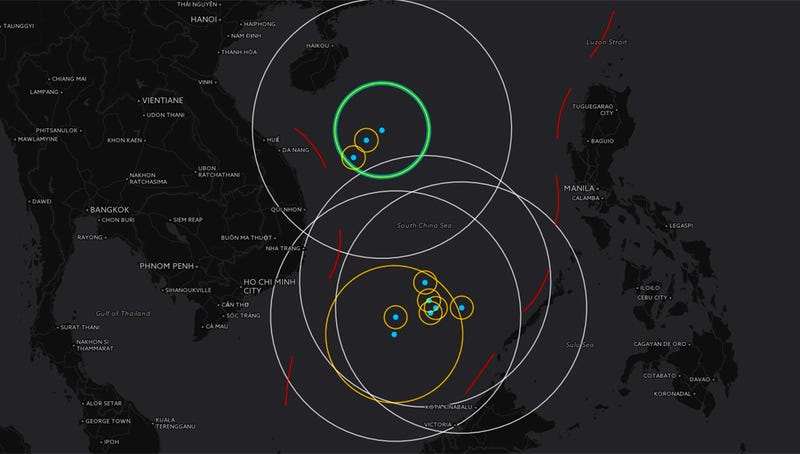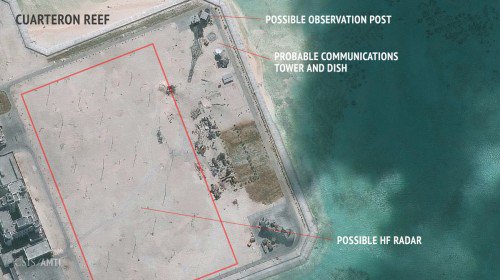National Security Agency Director Adm. Michael Rogers warns that encryption is making it “much more difficult” for the agency to intercept the communications of terrorist groups like the Islamic State, citing November’s Paris attacks as a case where his agency was left in the dark because the perpetrators used new technologies to disguise their communications.
In an exclusive interview with Yahoo News, Rogers confirmed speculation that began right after the attack: that “some of the communications” of the Paris terrorists “were encrypted,” and, as a result, “we did not generate the insights ahead of time. Clearly, had we known, Paris would not have happened.”
Rogers’ comments were made on Friday, just days before the FBI obtained a court order requiring Apple to provide a “backdoor” into the data on the iPhone of one of the shooters in the San Bernardino, Calif., terror attack in December — an order the company is resisting. But his remarks are likely to fuel the debate over encryption that has sorely divided the U.S. intelligence and law enforcement community, on one side, and privacy advocates and U.S. technology companies. (A spokesman for the NSA had no comment today on the court order or on Apple’s response.)
Rogers has at times sought to steer a middle ground in this debate, acknowledging that encryption is “foundational to our future” and even saying recently that arguing about it “is a waste of time.” In the Yahoo News interview, he frankly acknowledged, “I don’t know the answer” to unencrypting devices and applications without addressing the concerns over privacy and competitiveness, calling for a national collaboration among industry and government officials to solve the problem.
But he left little doubt about the impact encryption is having on his agency’s mission.
“Is it harder for us to generate the kind of knowledge that I would like against some of these targets? Yes,” Rogers said. “Is that directly tied in part to changes they are making in their communications? Yes. Does encryption make it much more difficult for us to execute our mission. Yes.”
Rogers also provided new details about his agency’s efforts to implement the USA Freedom Act, a law passed in the wake of the Edward Snowden disclosures, which he said has made it “more expensive” for his agency to access the phone records of terror suspects inside the United States and has resulted in a “slightly slower” retrieval of data from U.S. phone companies.
But Rogers said the delay in retrieving phone records is measured “in hours, not days or weeks,” and he has not yet seen any “significant” problems that have “led to concerns … this is not going to work.”
“When I say more difficult to do the job, it’s certainly a little slower,” he said. “There is no doubt about that. It is not as fast.”
The new law — which has become a contentious issue in the presidential campaign — requires the NSA to get a secret court order to retrieve individual domestic phone records rather than collecting them in bulk and storing them in agency computers, as it had been doing before the Snowden disclosures. Critics, such as Sen. Marco Rubio, charge that the act has weakened the country’s defenses in the face of the mounting threats from the Islamic State and other terror groups.
But Rogers confirmed for the first time that the law was used successfully by the NSA after the San Bernardino terror attack to retrieve the phone records of the two perpetrators, and the agency “didn’t find any direct overseas connections.” Those records provided “metadata” — the time and duration of phone calls — but not the content of emails and text messages that the FBI is seeking by requiring Apple to unlock one of the iPhones. The FBI is continuing its efforts to track down who the two shooters “may have communicated with to plan and carry out” the attack, according to a court filing Tuesday.
Rogers’ comments came during a rare and wide-ranging interview inside the “Battle Bridge,” a special NSA situation room at its headquarters in Fort Meade, Md., equipped with teleconference screens to the White House and secure facilities around the world. It was built after the Osama bin Laden raid for use during international crises.
The former Navy cryptographer described a far-reaching reorganization of the electronic spying agency — dubbed NSA21 — that he is implementing this month to cope with evolving new national security threats. Chief among them: persistent cyberattacks from “nation state actors,” who he said are repeatedly hacking into — and Rogers believes laying the groundwork for manipulation of — the nation’s critical infrastructure systems, such as the electrical grid, the banking system and the energy sector.
Those foreign powers — widely acknowledged to be Russia, China, Iran and North Korea, although he wouldn’t name them — are “penetrating systems, what we think is for the purpose of reconnaissance. To get a sense of how they are structured. Where are their vulnerabilities? What are the control points that someone would want to access?”
While Rogers said he was “not going to get into specifics,” U.S. officials have confirmed that those attacks included an Iranian hack into the computer system of a New York dam that alarmed White House officials in 2013 and a highly sophisticated Russian infiltration of an unclassified Pentagon Joint Staff computer network that prompted the NSA director to shut down the entire network for two weeks last summer.
“This is not episodic or short-term focused,” said Rogers, who also serves as commander of the U.S. Cyber Command. “My sense is you are watching these actors make a long-term commitment. How do we ensure we have the capability to potentially impair [their] ability to actually operate?”
Yahoo News asked Rogers what motivated the attacks.
“I believe they want to have the capability, should they come to a political decision, that they in some way want to interfere with the United States or send a message to us,” he said.
One question Rogers pointedly declined to address is whether any overseas intelligence services had penetrated Hillary Clinton’s unsecured private email server — a scenario that former Defense Secretary Robert Gates recently said was “highly likely.”
“It’s something I’m not going to get into right now,” he said when pressed by Yahoo News as to whether such a penetration had taken place.
Rogers’ answer to the threat of foreign cyberattacks, incorporated into NSA21, is to create a new Directorate of Operations by merging the agency’s Signals Intelligence directorate — its electronic spying arm, which intercepts hundreds of millions of telephone calls, emails and text messages around the globe — with its smaller Information Assurance arm, which works with private industry to defend U.S. computer networks.
The proposal has prompted criticism that it will heighten suspicions of the NSA, making private companies even less willing to cooperate with the agency for fear of being seen as part of its massive global surveillance mission.
“I have to admit, it was something I spent a lot of time, as did the team, thinking about,” Rogers said when asked about the criticism. He added later, “I certainly acknowledge that there are some who would argue, ‘Hey, but you have this perception battle.’ My statement to that would be, ‘We have that perception battle every single day of the year, given the fact that the NSA, we acknowledge, works in both the offensive [signals interception] and defensive [cybersecurity] structures.’”
Dealing with the “perception” of the NSA as an unchecked surveillance colossus has been Rogers’ principal challenge since he took over the agency nearly two years ago during the biggest crisis in its history — the aftermath of the Snowden leaks, described by his predecessor, Gen. Keith Alexander, at the time as “the greatest damage to our combined nation’s intelligence systems that we have ever suffered.”
A congenial career Navy cryptologist who previously was commander of the Navy’s Fleet Cyber Command, Rogers has sought to repair the agency’s image and mend fences with Capitol Hill, striking a noticeably more measured and less combative tone in his public statements than Alexander did.
But when pressed about the lingering impact of the Snowden disclosures and persistent questions among privacy advocates and members of Congress about the NSA’s continued “incidental” collection of U.S. citizens’ communications, Rogers was unyielding and unapologetic.
He twice refused, for example, to shed any light on how many Americans’ emails and phone calls are “incidentally” collected by the NSA in the course of intercepting the communications of foreign targets. “We don’t talk about the specifics of the classified mission we do,” he said. He declined to explain why such information would be classified but insisted that access to those communications by the FBI is governed by legal processes.
Rogers warned that terrorist groups such as the Islamic State are moving to encrypted apps and networks, the so-called dark Web — a trend he asserted was “accelerated” by the Snowden disclosures.
“The trend has happened much faster than we thought,” he said. “And the part that is particularly discouraging to me is when we get groups, actors, specifically discussing the [Snowden] disclosures saying, ‘Hey, you need to make sure you don’t do X, Y or Z, or you don’t use this, because remember we know the Americans are into this.
“You’ve seen al-Qaida expressly, for example, reference the [Snowden] disclosures. You’ve seen groups — ISIL does the same — talk about how they need to change their discipline, need to change their security as a result of their increased knowledge of what we do and how we do it.”
But while many experts have argued that the movement toward encryption is the inevitable result of evolving new technologies, Rogers pointed to Snowden.
“No one should doubt for one minute there has been an impact here,” Rogers said. “I will leave it to others to decide right, wrong, good or bad. But there shouldn’t be any doubt in anybody’s mind that there has been an impact as a result of these disclosures.”
Rogers has strong feelings about what should happen to Snowden, who remains in Moscow, hailed around the world by many civil liberties groups, receiving accolades and awards (and financial compensation for speeches he delivers via Skype) — all while remaining a fugitive from U.S. justice. Rogers has not seen “Citizenfour,” the Oscar-winning documentary by Laura Poitras that presents the former NSA contractor as a courageous whistleblower, and he says he will “probably” not see the upcoming film “Snowden,” due in theaters this May, by Oliver Stone.
Asked about proposals that Snowden should receive some sort of leniency as part of a deal that would bring him home, Rogers talked about the concept of “accountability.” He recalled a conversation he had with his father about the My Lai Massacre when he joined the Naval ROTC in the post-Vietnam era in 1981.
“Dad, what do you do when you get an order that you think is immoral, unethical or illegal?” he said. “And my father, something I’ll always remember, said to me, ‘Michael, you must be willing to stand up and say, “This I will not do.” But Michael, you must also be willing to be held accountable for the decision you have made. And don’t ever forget, son, responsibility and accountability are intertwined. And it ain’t one or the other. It’s about both.’ And that seems to have been forgotten in all of this.”




